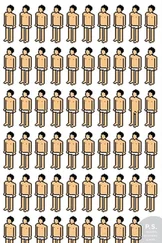"Hamilton?"
"At home. Wendy?"
"She's on double-shift at the hospital." They turn around and their eyes catch: fear.Gareth's body still rests on the floor as the sky darkens. A few of the crew members, unable to get anywhere in nightmare traffic and unable to think of anywhere else to go, return to the house. As a group, they wrap Gareth in a canvas tarpaulin and place him in a cool, animal-proof garden shed. And a few minutes later, as Linus and Pam pull out of the driveway in their car, the neighborhood's electricity fails and they drive down the hill under a soot gray sky.
Wendy's "day" had already passed the twenty-six-hour mark when her first sleeper arrived dead at the hospital just shortly into the lunch hour—a North Van housewife a neighbor had found sleeping on the steps outside her house, her Collie's leash in her hand, the dog whimpering. Wendy was examining this body when two more sleepers were brought through the door—an eight-year-old girl who had fallen asleep on a swing set and an elderly woman's husband who had fallen asleep on the passenger side of her car while driving to the pet food store. She thought he might have had a stroke.
And then the cord of normalcy snapped. Over the next several hours, Wendy helped catalog perhaps a hundred more sleepers, most of whom had been driven to the hospital by friends or family, owing to overtaxed ambulances. And for every body taken to the hospital there were hundreds if not thousands out there who didn't make it.
Later in the day, the radio broadcasted a plea saying that the hospitals were unable to process any further patients. Nothing was known about this new sickness, nor was any treatment available.
And now the hospital staff are confused and frightened beyond words, but they work on. Wendy reaches the thirty-four-hour mark and is dead on her feet and needs to sleep, yet at the same time she needs to go home—to check on Linus—Linus—as well as to … as well as to … what? Phones are out, cell phones, too.
What is happening is what Karen knows about. This also has something to do with Pam's and Hamilton's stereo dreams. The answer isn't at the hospital. The answer is back at Rabbit Lane.
Stepping over log booms of the dead, she is feeling almost as tired as the day's sleepers. She understands the sleepers and their completelack of fear as they go groggy and lie down wherever the need hits them. Wendy feels the same way, but she knows it's only sleep she needs at the moment, not death.
Linus had dropped her off at work yesterday, her own car being in the shop. She finds that the only transportation alternative available now is walking: Taxis gone; don't know how to steal a car. Walking will take a few hours, but she refuses to hitchhike—even out on Lonsdale all civil decency seems to have evaporated. In the dark, she walks up to the Trans-Canada highway, where cars are traveling at speeds she thought unimaginable. She spots two accidents—either sleepers or leadfoots—but no emergency vehicles attend the scene. Nobody seems to be slowing up, even for a juicy rubberneck, which strikes Wendy as most unusual human behavior. She considers this when, without warning, the Esso station by the Westview overpass explodes like a jet at an air show—bodies like ventriloquist dolls puked into the sky as though in a cartoon or an action-adventure film.
The traffic slows down and freezes, never to start again. 7s everybody going home? Will home be safe? Or perhaps home is only familiar. What do they expect at the other end that will make them feel safe? What will make them strong?
Wendy walks over to the gas station, where seared bodies lie in the grass embankment just below: all six thoroughly dead, no survivors. Shards of a VW bus remain where the gas pumps once stood amid the husks of shotguns and rifles. What can Wendy do? She's so tired she can barely think, let alone act.
From the grass below the station, Wendy picks up a twenty-four-pack of M&Ms and decides to walk onward; nobody can be saved here. And what other choices does she have? Only the electricity, perversely, seems to be intact: streetlights and the storefronts light the looted Westview Mall. Sleeping and dead bodies lie crash-dummied across the asphalt, sprinkled with broken liquor bottles and shop-front glass. How many people are dead? How many people will die?
Why is this happening? Am I infected? Is Linus okay? Where was everybody and will they reach home safely?Wendy looks onto the Trans-Canada, where many people like her, stranded without cars, are walking dronishly down the freeway's margin, shuffling inside the glare of the headlights stalled behind them. A middle-aged man in a yellow raincoat is asleep under the overpass. A multicar pileup has plowed off the Mosquito Creek bridge and down into the ravine.
Wendy decides to walk overground, through quiet suburban streets, around the small commercial strip at Edgemont Village where the armed forces are guarding a Super-Valu. Even there she can see a dead soldier asleep in a Starbucks alcove.
In one of the smaller streets, she finds a ten-speed bike lying on its side for no discernible reason. She looks around—nobody near—then takes it and pedals toward the dam, where she crosses over and reaches home through the dark forest she knows by heart.
24 THE PAST IS A BAD IDEA
Megan is keeled over a flower bed vomiting up the eel that writhes within her stomach; camouflaging her pregnancy is becoming increasingly difficult. In the flower bed's soil, she sees beer bottle caps and cigarette butts. Ugh. Skitter is no dream neighbor: shitty, oily car wrecks rust inside the garage; the lawn is a crab-grassed junkyard.
She feels her stomach giggle, as though the eel has left and a small bird is now fluttering inside her—this new piece of life. She wonders what personality her new child will have. Will it be condemned to loserdom with Skitter's DNA? Megan hasn't told Skitter about her pregnancy, nor does she feel likely to. Once she tells him, the child is no longer just her own; she'll have to share it. She doesn't want this.
She was tempted to mention her pregnancy last week when the Americans were up taping the TV show, but pulled back.
The TV show: Megan can't believe how sucky she looked in it, but she thinks it was more good than bad. She's happy that she and Karen came across as pals rather than as a mother-daughter unit. And Megan's also happy that they only gave Lois a small amount of air-time. Ha!
Walking in through Skitter's basement door, she catches a reflection of herself in a scrap of mirror leaning against the wall. Last night her head looked fat, but Karen, so emaciated in real life, looked almost fashionably thin. So what they say about cameras adding ten pounds is true. More like twenty.
Back inside the kitchen, Megan finds a clean mug and makes instant coffee and turns on the radio to a local rock station, at which point she notices sirens in the background obscuring the music. She looks down at her arms in the watery midday light: She is stronger now. She eats only good food. She exercises. She no longer does drugs, and she feels ridiculous being in Skitter's house—as though she's been forced back into the seventh grade. Stupid of her to end up here. She can faintly hear Skitter and Jenny making it in the bedroom.
The first sip of coffee burns her tongue, and she idly kills time melting a few undissolved coffee nodules on top of the coffee. She reads biker magazines for a while and time vanishes. She needs to vomit and again heads out into the flower bed. There, after a dry wretch, she lifts her head and sees a pair of plaid-trousered legs protruding from behind a corner of the neighbor's house. She walks over to investigate. It is an older man—sixty? He seems to have had a heart attack. She rings the man's doorbell, but nobody answers, so she returns to Skitter's to phone an ambulance. The phone is dead.
Читать дальше










